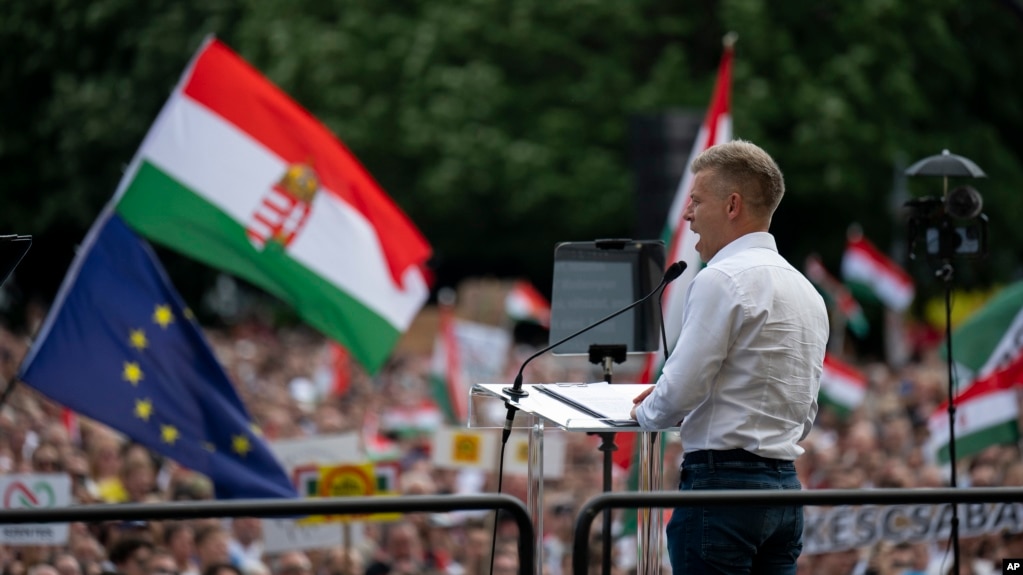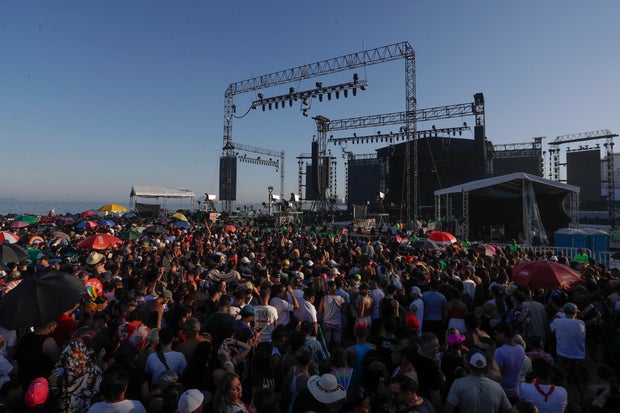Emerging Hungarian opposition leader attracts tens of thousands

Pounding the campaign trail ahead of European elections, emerging Hungarian opposition leader Peter Magyar drew tens of thousands on Sunday in a stronghold of nationalist leader Viktor Orban.
Speaking just before him was well-known screen actor Ervin Nagy, whose support Magyar has managed to grab to lend celebrity power to his campaign as his own star rises.
Magyar shot to prominence in February on the back of a scandal that hit Orban, posing the most serious challenge in his 14 years in power.
In Magyar's latest rally in Hungary's second biggest city, Debrecen, tens of thousands of people cheered on the former government insider who is now one of its fiercest critics.
"Change can be stopped for a few days, a few weeks, but no one in history has ever stopped it and neither can they," Magyar told the crowd.
Accusing the government of populism, cronyism and corruption, Magyar's campaign is raising hopes for a "system change", said actor Nagy, known from Hungarian films such as the historical horse-racing adventure "Bet on Revenge" and Oscar-nominated drama "On Body and Soul".
"Time has come for change... We have simply had enough," Krisztian Kovacs, a 29-year-old accountant, told AFP at the Debrecen rally.
Magyar, 43 and a self-declared conservative, since last month leads a political group, which aims to be "neither right nor left" to challenge Orban.
The campaign is growing so fast, Nagy had to lend the politician his pick-up truck to stand on for a speech at one spontaneous rally.
"We didn't have time to get a stage," said Nagy, 47.
"There's a revolutionary mood, like in 1956," he said -- a reference to the historic uprising against Hungary's Soviet-backed communist rulers.
'Dictatorship-lite'
Magyar seized the initiative in February when an ally of Orban, Katalin Novak, resigned as president after it was revealed she had pardoned a convicted accomplice of a child abuser.
Magyar's TISZA (Respect and Freedom) party has already eclipsed the rest of the opposition heading into the European elections on June 9.
A recent survey by pollster Median showed the party had 25 percent support.
Nagy says he had not been involved in politics before -- but Magyar only took an hour to convince him to join the campaign.
He believes the EU member country under Orban has been turned into a "kind of dictatorship-lite".

Since returning to power in 2010, Orban, 60, has changed laws to restrict independent media, civil society, arts and culture.
"If someone is defiant, if they go into opposition, or at least criticise the powers that be, there are consequences," Nagy told AFP.
He says he himself has been blacklisted after making a comment critical of a senior member of Orban's Fidesz party.
One producer was told that their film would not get financing if Nagy was in it, the actor said.
Nagy said Magyar could reach "millions of people who have (so far) preferred to stay away and not participate in the democracy just because they were so apathetic and frustrated".
Tough battle ahead
But Magyar faces tough resistance.
Orban has brushed off the challenge, but nonetheless "Fidesz has been making serious efforts to nip this movement in the bud," said political analyst Zoltan Lakner.
Posters commissioned by Fidesz have sprung up across the country, depicting Magyar as "Brussels' humble servant" alongside other opposition politicians.
He also faces negative coverage by media close to Fidesz, ranging from serious domestic abuse accusations, which he denies, to sneering at his "woman's sunglasses".
Last month, he said he came under investigation by the Sovereignty Protection Office, a controversial new government agency set up to curb foreign influence.
Magyar's supporters say his strength lies in knowing the system from the inside.
A lawyer by training, he worked for years as a diplomat in Brussels.
His ex-wife is a former Orban ally: former justice minister Judit Varga.
Magyar's biggest challenge, said Lakner, is to quickly build up his party, finding qualified people who do not pose a political risk causing "a lot of trouble later on".
"But if Magyar manages to unite opposition voters behind him, he can present a viable alternative for dissatisfied voters."
May 05, 2024
By Associated Press

A rising challenger to Hungarian Prime Minister Viktor Orban held what he called the largest countryside political demonstration in the country’s recent history Sunday, the latest stop on his campaign tour that has mobilized thousands across Hungary’s rural heartland.
Some 10,000 people gathered in Debrecen, Hungary’s second-largest city, in support of Peter Magyar, a political newcomer who in less than three months has shot to prominence on pledges to bring an end to problems like official corruption and a declining quality of life in the Central European country.
Supporters endured a brief but unexpected rain shower ahead of the afternoon demonstration, turning the city's central square into a sea of umbrellas. They waved Hungarian flags bearing the names of towns and villages across the country from which they had come.
“Today, the vast majority of the Hungarian people are tired of the ruling elite, of the hatred, apathy, propaganda and artificial divides,” Magyar told the crowd. “Hungarians today want cooperation, love, unity and peace.”
Magyar, a former insider within Hungary’s ruling Fidesz party, has since February denounced the nationalist Orban as running an entrenched “mafia state,” and declared war on what he calls a propaganda machine run by the government.
His party, TISZA (Respect and Freedom), has announced it will run 12 candidates in the June 9 European Union elections, with Magyar appearing first on the party list. TISZA has also announced it will run four candidates in local council elections in the capital Budapest.
His appearance Sunday in Debrecen, a stronghold of Orbán’s ruling Fidesz party, reflected the focus his fledgling campaign has placed on the Hungarian countryside, where Orban is popular.
The Mother’s Day event was the latest stop on a tour of the country where Magyar has appeared in dozens of cities, towns and villages, often drawing thousands of supporters — numbers that few Orban opponents have ever been able to mobilize in rural areas.
Addressing the crowd, he said that “government propaganda” had tried to discredit his movement as "just a downtown Budapest media hack,” and criticized Hungary's traditional opposition parties as having abandoned rural Hungarians.
“We’ve heard for 14 years from the opposition that it’s impossible in these circumstances to defeat Orban, that it’s not worth traveling to the countryside, that young people aren’t interested in politics, that you can’t break down the walls of propaganda,” he said. “But look around! What’s the truth?”
Katalin Nagy, who traveled several hours to the rally, said she finds Magyar credible “because he comes from the inside.”
“He’s aware of the things that are really causing problems in this country, and I think he can provide solutions to problems so that we can come out of the hole that this country is currently in,” she said.
Recent polls show that Magyar’s party may have become the largest opposition force in little more than a month before the election. Pollster Median this week measured TISZA at 25% among certain voters, with Orban’s Fidesz well ahead at 45%.
Governing party politicians have dismissed Magyar, who describes himself as a moderate conservative, as a leftist in disguise, and suggested that foreign interests lie behind his rise.
Orban and has party have ruled Hungary with a constitutional majority since 2010.
















A signed article by Chinese President Xi Jinping titled "Carrying Forward the Spirit that Guided the Establishment of China-France Diplomatic Relations, Working Together for Global Peace and Development" was published Sunday on French newspaper Le Figaro upon his arrival in Paris for a state visit to France.
Here is the full text of his article.
Carrying Forward the Spirit that Guided the Establishment of China-France Diplomatic Relations, Working Together for Global Peace and Development
Xi Jinping
President of the People's Republic of China
I am delighted to pay my third state visit to France at the invitation of President Emmanuel Macron.
France holds a special fascination for us Chinese. This country has produced a galaxy of philosophers, writers, and artists with global appeal who have inspired all humanity. Over 150 years ago, French nationals helped China found its Fujian Navy Yard and the Fujian Naval Academy. France was also the first country to welcome government-sponsored students from China. A century ago, a number of young Chinese traveled to France for further education. Some of these young patriots went on to make remarkable contribution to the founding and development of New China. France was also the first major western country to enter into formal diplomatic ties with New China.
The year 2024 is of special significance. I will visit France bringing with me three messages from China.
—China will work with France to carry forward the spirit that guided the establishment of their diplomatic ties, build on past achievements and open new vistas for China-France relations.
This year marks the 60th anniversary of China-France relations. Six decades ago, General Charles de Gaulle, with a strategic vision based on the trend of the time, resolved to establish diplomatic relations with New China. It wasn't easy to make this independent decision at the height of the Cold War, but it has proven to be right and foresighted. With the establishment of China-France relations, a bridge of communication between the East and West was built, and the international relations were able to evolve in the direction of dialogue and cooperation.
In these six decades, China-France relations have stayed abreast of the times. Our two countries took the lead in establishing a comprehensive strategic partnership and launching institutional strategic dialogue in China's relations with Western countries. We spearheaded cooperation in aviation and nuclear energy and on third-party markets. We were among the first to mutually open cultural centers and start cultural year activities, providing guidance for mutual learning between civilizations. China-France cooperation contributed to the conclusion of the Paris Agreement on climate change and the Kunming-Montreal Global Biodiversity Framework, boosting strongly the implementation of the global climate agenda.
History is our best teacher. We live in a world that is far from being tranquil and is once again facing a multitude of risks. China is ready to work with France in the spirit that guided the establishment of our diplomatic ties to forge a stronger comprehensive strategic partnership between our two countries and make new contributions to stronger cooperation of the global community.
—China will open even wider to the world and deepen cooperation with France and other countries.
This year marks the 75th anniversary of the People's Republic of China. Through 75 years of perseverant hard work, the Chinese people have turned China from an impoverished country into the second largest economy in the world. Several hundred million people in rural areas were lifted out of poverty, a miracle in the history of humanity. The Chinese economy registered 5.2 percent growth in 2023, and is expected to grow by around 5 percent in 2024 with greater progress toward high-quality development. China will remain a source of global growth and create opportunities for all countries.
One thing that has made China's development possible is our firm commitment to opening up. We welcome more quality French farm products and cosmetics to the Chinese market to meet the ever-growing needs of the Chinese people for a better life. We welcome investment by companies from France and other countries to China. To this end, we have fully opened up China's manufacturing sector, and will move faster to expand market access to telecom, medical and other services. We also have a 15-day visa-exemption policy for visitors from many countries including France, and we have taken further measures to facilitate travel and payment by foreigners in China.
While opening up itself, China also encourages Chinese companies to go global. France is advancing re-industrialization based on green innovation, whereas China is accelerating the development of new quality productive forces. Our two countries can deepen cooperation on innovation and jointly promote green development. Some Chinese companies have set up battery plants in France. The Chinese government supports more Chinese companies in investing in France. And we hope that France will ensure that they operate in a fair and equitable business environment.
—China will strengthen communication and coordination with France to uphold world peace and stability.
This year marks the 70th anniversary of the Five Principles of Peaceful Coexistence. Seven decades ago, Chinese Premier Zhou Enlai put forth in full the five principles for the first time —"mutual respect for sovereignty and territorial integrity, mutual non-aggression, mutual non-interference in each other's internal affairs, equality and mutual benefit, and peaceful coexistence." Through 70 years, the Five Principles of Peaceful Coexistence have been widely accepted and recognized by countries across the world. They have become an important norm governing contemporary international relations.
China has faithfully practiced the Five Principles of Peaceful Coexistence. Over the past 70-plus years since its founding, New China never provoked a war or occupied an inch of foreign land. China is the only country around the world that includes in its Constitution the commitment to the path of peaceful development, and China is the only country among the major nuclear-weapon states that is committed to no-first-use of nuclear weapons.
I have proposed in recent years the Global Development Initiative, the Global Security Initiative, and the Global Civilization Initiative. As part of China's efforts to help improve global governance and resolve tough question regarding human development, the three initiatives have won the support of more than 100 countries and international organizations.
China understands the repercussions of the Ukraine crisis on the people of Europe. China did not start the Ukraine crisis, nor is it a party to or a participant in it. Nonetheless, China has been playing a constructive role in striving for peaceful settlement of the crisis. I have made many appeals, among others, observing the purposes and principles of the UN Charter, respecting sovereignty and territorial integrity of all countries, and addressing the legitimate security concerns of all sides. I have stressed that nuclear weapons must not be used, and a nuclear war must not be fought. China has delivered to Ukraine many shipments of humanitarian aids, and sent its special representative many times to mediate among the countries concerned. The longer the Ukraine crisis drags on, the greater harm it will do to Europe and the world. China hopes that peace and stability will return to Europe at an early date. We stand ready to work with France and the whole international community to find a reasonable way out of the crisis.
The Palestinian-Israeli conflict pulls on our heartstrings as well. The fundamental solution lies in the establishment of an independent State of Palestine. History has repeatedly shown that the recurrent Palestine-Israel problem is rooted essentially in the failure of actual enforcement of relevant UN resolutions, in the continued erosion of the foundation for the two-state solution, and the deviation of the Middle East peace process. China and France have many in common on the Palestine-Israel issue. It is thus critical that we strengthen cooperation and help restore peace in the Middle East.
Confucius observed that "a man of true moral integrity is one who is both friendly but independent, and who does not compromise his principles, and who is independent without any bias or taking sides. How unflinchingly firm he is in his strength!" French writer Romain Rolland said that "it is so much easier to allow oneself to be guided than it is to think for oneself. This abdication is the kernel of the mischief." Both China and France value independence as two major countries. Our interactions in the long course of history have released tremendous energy swaying the trajectory of the world. Now we are standing at another historical starting point. Let us join hands together on this new journey toward greater progress in China-France relations to the benefit of our two countries and the world!